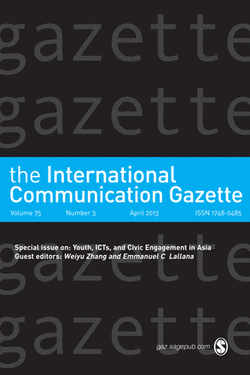 Our special issue on "Youth, ICTs and Civic Engagement in Asia" is published in International Communication Gazette!!! Thanks to my co-editor and project head Emmanuel Lallana, and dear collaborators Clarissa David, Mohammad Sahid Ullah, P. Vigneswara Ilavarasan, and Joanne Lim! Speical thanks to the editor, manager, and proofreader of this journal too. They are all so professional that this issue gets published smoothly and timely. Highly recommend my colleagues to submit to this journal! You can download the entire issue HERE! A table of content is found here.
0 Comments
I was invited to deliver a keynote lecture for the 22nd International Youth Forum in Seoul, organized by The Ministry of Gender Equality and Family and The National Council of Youth Organizations in Korea. It was a great opportunity for me to ponder on what I have done in the last three years when trying to run a six-country comparative research project. I really did not want to lecture my audiences as they probably have heard much in school. The four words in the title are among the most meaningful to me in the recent years. It is a speech that targets myself as well.
The two sections on Change and Youth are presenting the factual observations I had during my research trips. The last two on Failure and Excellence tried to convey a message: Excellence does not require success and heading to a highly possible failure is a brave choice that already indicates excellence. Allow me to insert an excerpt here: "Alright. It seems that failure is a given fact and success is only the beautiful scenery we enjoy on our way to greater failure. So what are we trying to achieve here? What are we challenging ourselves to get? What are we risking our comfort for? If it is neither success nor failure, what is it? It is excellence. Excellence, by definition, means the fact or state of excelling. To excel is to surpass the ordinary standards. As long as we are trying to surpass what have been achieved by either others or ourselves, we are excelling or we are headed towards excellence. A sportsman excels when she breaks her own record. A student excels when she learns new knowledge. A politician excels when she speaks for the neglected. Excellence is different from success because it is more about your own pursuit than conforming to how others judge you. It is you who decides what to excel, how to excel, and when to stop. As long as a person excels in her own regard, we should show our full respect." I truly thank my colleague Catherine Candano for reviewing the manuscript and giving me feedback. A full manuscript can be found here. I am totally excited by this upcoming project that NUS is organizing. During the brainstorm meeting, I threw my brain into the storm and proposed a migrant worker study that tries to apply ICTs into supporting the long-distance relationship between the workers and their rural families. The more I think about it, the more I feel that my current research paradigm is challenged.
1. The inter-disciplinary nature of this project: Previously my experience of multiple disciplines is limited to my own exposure to theories and research from different disciplines. But the purpose of the studies is the same -- to answer a question or to test a hypothesis. This project includes people from the computing school, the design school, and the social sciences. The purpose of this project is not just about research. It puts more emphasis on applications. 2. The problem-solving orientation of this project: I have never done a research that really solves a problem or implements a solution. The factors I will consider are quite different here. I become less concerned about the cleanness of my design (e.g., internal validity) than the success of solutions. Dr. Hornick (Annenberg, UPenn) once said that the most sucessful campaign might be the most messy campaign that mobilizes all possilbe social forces. 3. Poor people still have social needs: Probably becasue of my acceptance of Maslow's hierachy of needs, I did not realize that I put physiological needs ahead of any other needs and assumed that without satisfying the physicological needs, no other needs should be considered. This is not true. Social needs such as love and belonging do not come after physicological needs . They exist along with the physiological needs. Therefore, we should use technolgoy to address these needs. A final note: there is no useless reading. I do not know why I started reading books about Chinese rural communities during summer. I simply felt interested. Now the project comes. Now I see the value of reading all items from Baidu news search with the key word "peasants" for three months. |
Weiyu Zhang
I am an Associate Professor at Department of Communication and New Media, National University of Singapore. Categories
All
Archives
January 2019
|
 RSS Feed
RSS Feed
